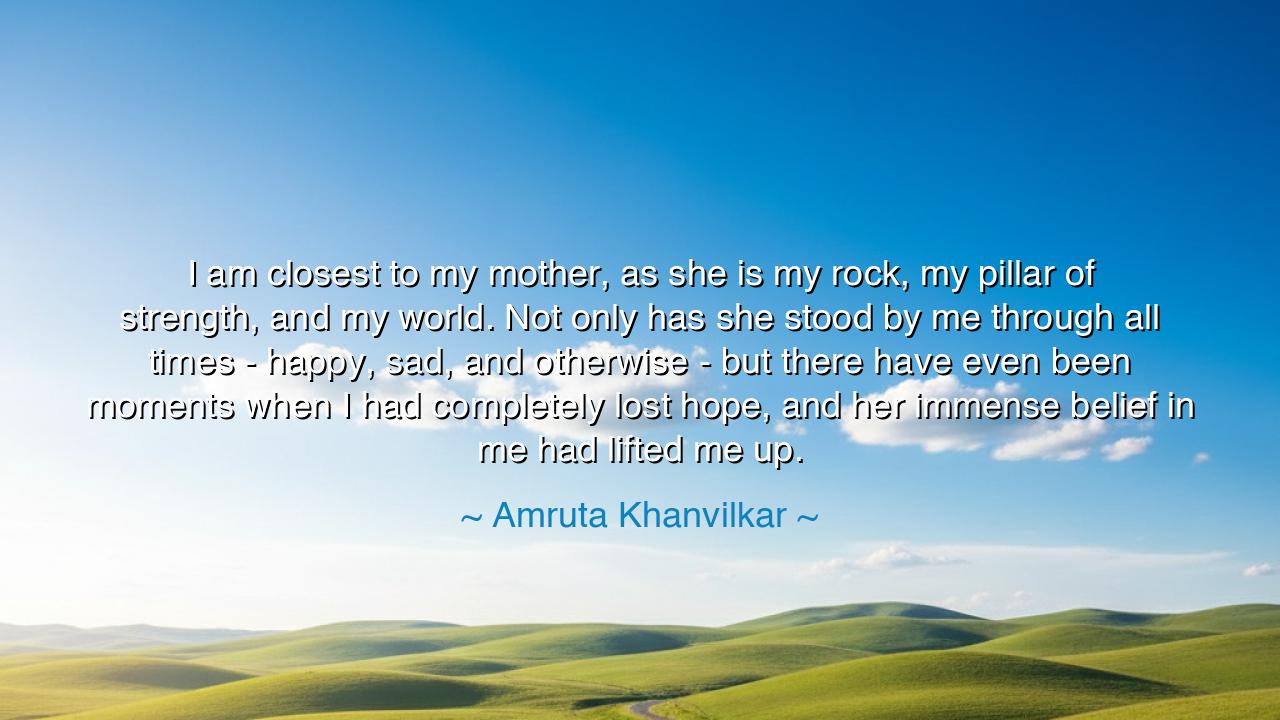
I am closest to my mother, as she is my rock, my pillar of
I am closest to my mother, as she is my rock, my pillar of strength, and my world. Not only has she stood by me through all times - happy, sad, and otherwise - but there have even been moments when I had completely lost hope, and her immense belief in me had lifted me up.






There are bonds in life that anchor the soul when the world itself seems adrift. Amruta Khanvilkar reflects on such a bond when she says, “I am closest to my mother, as she is my rock, my pillar of strength, and my world. Not only has she stood by me through all times—happy, sad, and otherwise—but there have even been moments when I had completely lost hope, and her immense belief in me had lifted me up.” In these words lies the timeless truth that the heart of a mother can be both sanctuary and springboard—offering solace, courage, and unwavering faith when all else fades.
The figure of a mother as a pillar of strength is as ancient as civilization itself. In the epics of old, mothers guided heroes through trials: Thetis counseled Achilles, Jochebed protected Moses from the Nile’s waters, and Amma in Vedic tradition embodies the nurturing energy that sustains life. Khanvilkar’s tribute is part of this eternal thread, highlighting that the love and belief of a mother are not mere comforts—they are forces that shape destiny, instilling resilience where despair threatens to take root.
To call someone a rock is to acknowledge both permanence and support. Rocks endure the storm, unmoved and steadfast, and those who lean upon them find balance. In moments of joy, the rock is a witness; in moments of sorrow, it is a refuge. Khanvilkar notes that her mother has stood beside her in happiness and sadness alike, reminding us that true guardianship is not selective—it is unwavering, consistent, and enduring. Such constancy nurtures confidence, teaching that even in life’s turbulence, stability can be found in love.
The power of belief emerges most strongly in the darkest hours. Khanvilkar recounts times when she had “completely lost hope,” yet her mother’s faith lifted her. Throughout history, this dynamic has shaped extraordinary lives. Consider Abraham Lincoln, who often struggled with despair, yet was sustained by the steadfast support of those who believed in his vision, including his stepmother and close friends. It is in such moments—when hope falters and uncertainty looms—that the confidence of a loved one becomes a bridge to perseverance.
Beyond personal support, the mother’s belief serves as a mirror reflecting potential. Often, we cannot see our own capacities when doubt clouds our vision. A mother’s faith illuminates what we might otherwise miss: courage, strength, and the promise of renewal. By holding her child in unwavering esteem, she conveys a truth that is difficult to internalize alone: that the human spirit, even when bowed, contains a reservoir of power ready to rise again. Khanvilkar’s words echo the wisdom of sages who taught that mentorship, encouragement, and belief are instruments of transformation.
This intimate bond is also a lesson in reciprocity and gratitude. Recognizing the immense influence of maternal support encourages us to honor, cherish, and emulate such constancy in our own lives. Mothers, mentors, and guides who invest belief and love in others create ripples that extend far beyond the immediate relationship. Their faith becomes a legacy, empowering the next generation to navigate adversity with courage and integrity. Khanvilkar’s acknowledgment is therefore not just tribute—it is testament to the transformative power of devoted support.
From this, we may draw an enduring truth: love and belief are among the most potent forces in human life. When despair threatens to overwhelm, when challenges seem insurmountable, the encouragement of a devoted soul can illuminate the path forward. It is a reminder that no individual is an island; we are shaped and sustained by those who steadfastly anchor us to hope, even when we cannot find it ourselves.
Thus, let every listener reflect on the lesson within Khanvilkar’s words: cherish the pillars of your life, honor those whose belief uplifts you, and strive to become a similar rock for others. In moments of joy, sadness, or despair, let faith, love, and unwavering support be the instruments that lift hearts. For it is in this sacred reciprocity—the giving and receiving of belief—that human life attains both resilience and grace. The mother, the guardian, the unwavering believer—these are the forces that turn despair into hope and potential into destiny.






AAdministratorAdministrator
Welcome, honored guests. Please leave a comment, we will respond soon